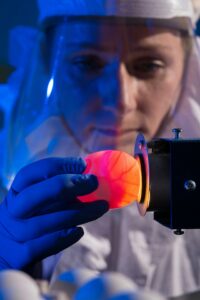Reasons Why Elon Musk Believes That Brain Chips Will Be Available Much Sooner Than We Think

Reasons Why Elon Musk Believes That Brain Chips Will Be Available Much Sooner Than We Think
Musk is well-known for his audacious forecasts, which include the colonization of Mars, the development of self-driving vehicles, and the construction of subterranean hyperloops. However, one of his most contentious and forward-looking assertions is about something that is far more concerned with the individual: implanting chips in our brains. According to Musk, this is not a science fiction fantasy that will be realized in the far off future. The majority of us are under the impression that this technology will arrive far sooner than we think it will.
There has been a long-standing fascination among scientists, philosophers, and futurists over the concept of combining the human brain with machinery. In contrast, Musk is working to transform that concept into a very real (and more sophisticated) piece of hardware via his firm, Neuralink, which specializes in neurotechnology. Not only does he want to read your thoughts, but he also intends to improve your brain, heal significant medical ailments, and even get mankind ready for the arrival of artificial intelligence.
Why, then, does Musk have such a strong belief that the ability to create brain chips is just around the corner? In the not too distant future, what precisely will it do, or not do, in the future?
An Explanation of the Neuralink Concept
In 2016, Elon Musk was one of the co-founders of Neuralink, which was dedicated to the development of a brain-computer interface, also referred to as a BCI. In principle, the concept is simple, but in fact, it is quite complicated: the goal is to develop a chip that can be implanted into the human brain in order to connect directly with computers.
At the outset, the purpose of Neuralink was to serve the medical community. The objective of Musk and his colleagues was to provide assistance to those who were afflicted with neurological disorders, brain traumas, and paralysis. Through the process of linking the brain to a computer, it is possible that they may hypothetically restore mobility, enable patients to operate digital equipment with their thoughts, and assist the brain in relearning capabilities that it has lost.
Musk’s long-term ambition, however, extends beyond the realm of health. He is of the opinion that as the capabilities of artificial intelligence continue to advance, it is imperative that humans find a mechanism to “keep up” with the technology. This implies merging with machines on a biological level. The following is a quote from him: “If you can’t beat AI, you might as well join it.”
The technology is already available, in a sense.
Although the concept of brain implants may seem like something out of a Hollywood dystopian film, the technology has already been put through its paces in the real world. Demonstrating that the chip can monitor brain activity and even enable animals to connect with computers only via the use of their thoughts, Neuralink has successfully performed tests on animals, including pigs and monkeys, demonstrating its capabilities.
Early in the year 2024, Neuralink made the announcement that it had successfully implanted its gadget into a human being for the very first time. This was a significant achievement that Musk hailed as a breakthrough almost immediately. According to reports, the patient was able to move a cursor on a screen only by thinking, which startled the scientific community and sent waves through the community of technology professionals.
According to Musk, this achievement is evidence that the timeframe is moving farther forward. Despite the fact that legislative obstacles still exist, he has openly claimed that millions of people might someday benefit from Neuralink’s technology. This includes not just those who have medical concerns, but also regular users who wish to better their memory, increase their ability to concentrate, or connect with artificial intelligence in a more profound manner.
The Reasons Why Musk Thinks It Will Happen Much Sooner Than You Think
Musk is notorious for pushing schedules, often in an unreasonable manner; yet, he is sure that brain chips are advancing quickly for a number of different reasons. As a first step, the hardware is becoming more compact and intelligent. In the present version of Neuralink’s chip, which is about the size of a coin, there are minuscule threads that are thinner than a human hair and are transplanted into the brain by means of a surgical robot.
Furthermore, the advancements that have been achieved in machine learning have made it simpler for computers to effectively read brain signals. The system is able to begin to “understand” how a person plans to move, talk, or interact with software if it is provided with sufficient training data, and it may react in real time to this understanding.
There is a rising interest from the global medical community as well as the technology industry. There is a race among other firms to build their own brain interfaces, and researchers are becoming more and more amenable to the idea of conducting clinical studies. Musk is of the opinion that if Neuralink receives sufficient financing, it will be able to begin growing manufacturing and spreading its operations within a few years.
To conclude, Musk’s motive is not just about innovation; rather, it is about ensuring his own survival. He is of the opinion that as artificial intelligence continues to advance and become more prevalent, humans run the possibility of finding themselves obsolete. It is his answer? To become one with the machines. According to his point of view, a brain chip is not only beneficial; rather, it is necessary for the future of mankind.
What Brain Chips Might Be Capable Of Doing, and What They Refuse to Do (Yet)
At this point in time, the technology behind brain chips is still in its newborn stage. Although the idea has been shown to be effective in animal and preliminary human experiments, it is not yet suitable for widespread use. The implants call for a sophisticated surgical procedure. Nobody knows what the long-term implications will be. On top of that, there are a great deal of problems about safety and ethics.
Despite this, the potential is really high. Within the next ten years, brain chips may be able to assist those who are paralyzed in controlling prosthetic limbs, enable the blind to “see” via the use of digital input, and assist stroke patients in regaining their speech and movement abilities. It is possible that in more sophisticated applications, they may help with memory recall, emotional management, or even direct communication between the brains of different people.
On the other hand, there is a ton of buzz. In the same way that The Matrix gives us the ability to download talents, brain chips will not instantly transform us into superhumans. Due to the brain’s extraordinary complexity, it may take many decades to decipher it completely. Even if progress is being made quickly, broad adoption is still years away, not months, from occurring. Musk’s projections are often cautiously optimistic.
Ethics, privacy, and control are the three most important questions.
Despite the fact that this technology is quite exciting, it also poses a great deal of problems. In the event that your brain is linked to a computer, who is the owner of the data? Would it be possible to hack, monitor, or sell one’s thoughts? If there is a problem with the chip, what will happen? What happens if governments or companies abuse the technology for the purpose of controlling or monitoring a population?
The dangers have been highlighted by Musk himself. He has advocated for the regulation of artificial intelligence and has had open conversations on the risks associated with unchecked artificial intelligence. However, a significant number of skeptics are of the opinion that Neuralink, despite the fact that it has a great deal of potential, requires a great deal more ethical control and long-term testing before it can become widely used.
The psychological element is another factor to consider. What would happen to your sense of who you are if you had a brain chip? Do you think it may have an influence on your emotions? And in a world that is becoming more digital, would individuals feel the need to acquire one in order to maintain their competitive edge?
Despite the fact that the time is ticking, these are questions that we have not already addressed.
We are far closer to the future than we realize.
Ever since he was a child, Elon Musk has been obsessed with the future. While some refer to him as irresponsible, other people call him a visionary. However, when it comes to the science of brain chips, there is no question that he is pushing the limits of what is conceivable.
The concept of combining human brains with machines is already a part of our everyday lives, regardless of whether Neuralink becomes a widely used tool or continues to maintain its status as a specialized medical breakthrough. It is no longer a question of if or not, but rather when, and how far we are ready to go.
Therefore, it is possible that brain chips will be here sooner than we anticipate. But developing the technology is not the only obstacle to overcome. In other words, it is ensuring that it serves humans rather than the other way around.






